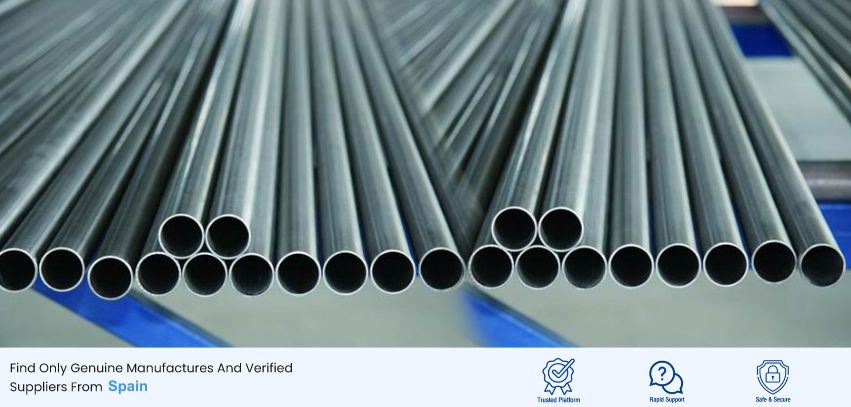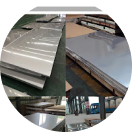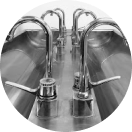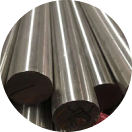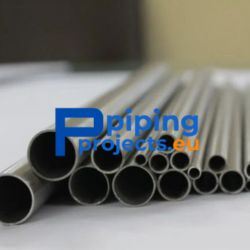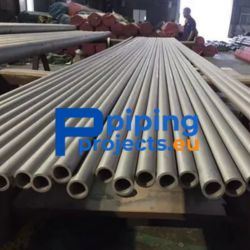Steel Tube Manufacturer in Spain - PipingProjects.eu
PipingProjects.eu is one of the leading Steel Tube Manufacturer in Spain. A steel tube is a cylindrical hollow structure made predominantly of steel, renowned for its versatility and widespread use across diverse industries. These tubes are manufactured through processes such as seamless extrusion or welding, providing varying shapes and dimensions to cater to specific applications. As a top Steel Tube Supplier in Spain, our Steel Tubes serve multitude of purposes, ranging from structural support in construction and infrastructure projects to conveyance of fluids, gases, or solids in industrial, mechanical, and plumbing systems.
WHAT IS STEEL TUBE?
Steel Tube refers to a hollow, cylindrical structure made of steel, typically manufactured through processes like welding, seamless extrusion, or electric resistance welding (ERW). Steel Tubes come in various shapes, sizes, and thicknesses, depending on their intended application. Steel Tubes are widely used in construction, infrastructure, transportation, manufacturing, and various other industries due to their strength, durability, and versatility. They can be found in structural support beams, pipelines, handrails, fencing, automotive components, furniture, and more.
Top leading Manufacturing Companies
WHAT MAKES STEEL TUBES DIFFERENT FROM REGULAR TUBES?
- The main difference between steel and regular tubes is their material composition and properties. Although "regular tubes" can refer to tubes made from different materials, steel tubes are specifically composed of steel, providing unique benefits such as strength, durability, and versatility. Steel's properties make it resistant to external forces, corrosion, and high-pressure conditions, making it ideal for various applications, including construction, infrastructure, and industrial systems.
- Steel tubes possess distinct attributes that arise from the inherent properties of steel, such as its strength, flexibility, and ability to be shaped. Compared to other materials, steel tubes frequently demonstrate exceptional load-bearing capacities, making them well-suited for structural uses and situations prioritising strength. In addition, steel tubes can be made in various shapes, including seamless and welded types, which makes them even more adaptable to meet specific project requirements. Steel tubes are renowned for their dependability and effectiveness in various industrial environments, whether utilised for fluid transportation, structural reinforcement, or mechanical purposes.
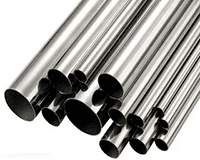
Steel Tube
Steel Tube - Specifications
- Product : Steel Tube
- Wall Thickness : 0.3 to 50mm
- Standards : ASTM A312, ASTM A269, ASME SB677, ASTM A213, ASME SA 789/ASTM A789. ASME SA 790/ASTM A790
- Manufacturing Type : Seamless
- Shape : Square, Round, Box Section, Rectangle
- Manufacturing Technology : Hot / Cold Formed

Trusted
Supplier

Genuine
Product

Easy
purchase
WHAT MATERIALS IS USED TO MAKE STEEL TUBES?
As a leading Steel Tube Manufacturer in Spain, steel tubes are made for different industrial uses and are created using different materials. Carbon steel is favoured due to its durability and affordability, making it capable of enduring moderate temperatures and pressures. Nevertheless, it may require protective coatings to avoid rusting.
PipingProjects.eu is a trusted Steel Tube Supplier in Spain. Alloy steel is the preferred option for power generation due to its combination of various alloys like chromium, molybdenum, and nickel. This enables it to withstand extreme temperatures and pressures. On the other hand, stainless steel is commonly used in environments with corrosive substances or high temperatures, such as the petrochemical and chemical processing industries. It has excellent corrosion resistance and performs well under high temperatures.
STEEL TUBE CHEMICAL EQUATION
CHEMICAL EQUATION
| Grade |
C |
Mn |
Si |
P |
S |
| A1 |
0.27 |
Max 0.93 |
0.10 |
0.035 |
0.035 |
TUBE MECHANICAL PROPERTIES
TUBE MECHANICAL PROPERTIES
| Tensile Strength |
Yield Strength |
Elongation |
Hardness |
| ≥415 |
≥255 |
≥30 |
≤79 |
HOW TO MAINTAIN AND INSPECTED STEEL TUBES ?
- It is essential to maintain and inspect steel tubes to ensure they last long and perform well in different uses. Regular maintenance involves checking for corrosion, wear, or damage and addressing any problems promptly to prevent deterioration. Cleaning the tubes regularly helps remove debris, contaminants, and corrosive substances that can build up over time. Depending on the application, applying protective coatings like anti-corrosion paints or galvanization can improve the tubes' resistance to environmental factors.
- Inspections should include visual assessments, dimensional checks, and non-destructive testing methods to identify any structural weaknesses or defects. Additionally, monitoring performance and operating conditions can help detect issues early and allow for timely intervention. Following a routine maintenance schedule and industry best practices contribute to the overall reliability and longevity of steel tubes.
STEEL TUBE OUTER DIAMETER
OUTER DIAMETER
|
Outer Diameter In mm
|
Permissible Variations In mm |
| Over (+) |
Under (-) |
| 1 to 1 ½ (25.4 to 38.1), Incl |
0.006 (0.15) |
0.006 (0.15) |
| Under 1 (25.4) |
0.004 (0.10) |
0.004 (0.10) |
| Over 11⁄2 to 2 (38.1 to 50.8), Excl |
0.008 (0.20) |
0.008 (0.20) |
| 21⁄2 to 3 (63.5 to 76.2), Excl |
0.012 (0.30) |
0.012 (0.30) |
| 2 to 21⁄2 (50.8 to 63.5), Excl |
0.010 (0.25) |
0.010 (0.25) |
WHAT ARE THE DIFFERENT TYPES OF STEEL TUBES?
- ERW (Electric Resistance Welded) Tubes: ERW tubes are created by joining together strips that have been welded lengthwise. They are frequently utilized in structural and industrial settings.
- Galvanized Round Tubes : Galvanized round tubes are commonly used in outdoor applications because they are coated with a layer of zinc, which helps to improve their corrosion resistance.
- Precision Seamless Tubes : Precision Seamless Tubes are produced with exceptional accuracy to meet the demands of applications that require precise tolerances and flawless surfaces.
- ERW Round Tubes : ERW Round Tubes are created using high-frequency electrical currents to weld steel sheets into tubes.
- Duplex Stainless Steel Tubes : Duplex stainless steel tubes provide a blend of austenitic and ferritic stainless steel advantages, delivering exceptional strength and resistance to corrosion.
Various Types of Steel Tube
PipingProjects.eu is a leading Steel Tube Supplier in Spain. These are a few examples of Steel Tubes you can find at Piping Projects in Spain.
ADVANTAGES OF USING STEEL TUBE
Steel tubes provide a superior solution for applications that can withstand high temperatures. Their exceptional resistance to extreme heat and pressure makes them a dependable choice for various industrial processes, power generation, and heating systems. These tubes effectively transfer heat from combustion to water, producing steam or hot water for a diverse range of purposes. Moreover, their capacity to endure elevated temperatures without distortion or deterioration guarantees consistent and reliable performance even in challenging environments.
HOW TO PREVENT STEEL TUBES FROM RUSTING?
- Taking proactive measures against corrosion is necessary to maintain the durability and longevity of steel tubes. Various coatings and methods can be used to prevent rust formation in steel tubes.
- One of the most effective techniques is galvanization, which involves applying a layer of zinc onto the steel surface. This zinc coating acts as a protective barrier, rusting before the underlying steel and ensuring prolonged defence against corrosion. Galvanized steel pipes are widely used in outdoor and water-related applications.
- Steel tubes can also be coated with substances that possess rust-inhibiting properties, such as polyethene, epoxy, or polypropylene, to prevent rust formation. These coatings create a protective barrier that prevents moisture and oxygen from penetrating the steel surface and initiating rust.
- Products that contain Volatile Corrosion Inhibitors (VCIs) release vapours that efficiently hinder rust formation and protect steel surfaces from corrosion. These VCI products are commonly used to protect steel tubes during transportation or storage.
WHAT IS THE DIFFERENCE BETWEEN SEAMLESS AND WELDED STEEL TUBES?
- Seamless and welded steel tubes differ primarily in their manufacturing processes. Seamless tubes are produced by extruding a solid billet through a piercing rod, resulting in a seamless cylindrical shape without any weld seams. This method ensures a consistent structure, making seamless tubes ideal for applications requiring high-pressure resistance or corrosion-sensitive applications.
-
On the other hand, welded tubes are created by welding together flat steel sheets or strips, which introduces a visible seam. Although welded tubes may have slightly lower strength and a textured appearance than seamless ones, they are often more cost-effective and suitable for applications with less stringent demands. Choosing between seamless and welded tubes depends on specific usage requirements, pressure tolerance, structural considerations, and budget constraints.
Clients Project Report of Steel Tube
PipingProjects.eu is one of the leading Steel Tube Supplier in Spain. Our team responsible for packing and shipping ensures that our products are of high quality and have accurate dimensions. We use packaging methods that are resistant to damage, ensuring our products arrive in excellent condition.
Client Projects of Steel Tube
| Product supplied |
Countries |
| Steel Tube Supply |
Granada |
| All types of Steel Tube |
Barcelona |
| Steel Tube Supplier |
Seville |
| Stainless Steel Tube |
Madrid |
